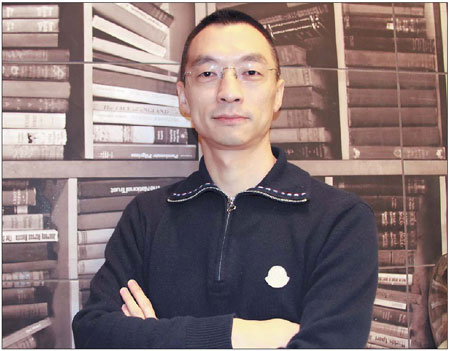Information game changer
|
Hudong.com founder and CEO Pan Haidong. Zhang Yuwei / China Daily |
With more than 5 million articles, homegrown online encyclopedia Hudong.com is what Chinese netizens are accessing for their bits and bytes. Zhang Yuwei reports from New York.
In 2005, when Pan Haidong founded Hudong.com in Beijing, he had a simple goal: to provide information. Today, Hudong has become the world's largest Chinese encyclopedia website, with more than 5 million articles and more than 13 million users.
Pan, 37, was recently named a Young Global Leader 2011 by the World Economic Forum.
Pan says he is just one of China's "innovative brains" and has seized an opportunity created by the country's booming Internet market.
By December, China's Internet users numbered 450 million - more than the population of the United States. Many experts say that with the current 31 percent Internet penetration rate (compared with more than 70 percent in the US), there is still much room for growth.
The Sichuan province native's aspirations to become an Internet entrepreneur were kindled by a seminar he attended 10 years ago, while serving as vice-president of the Harvard China Review - a Boston-based nonprofit organization.
Among the speakers was Ma Yun, or Jack Ma, the founder of Alibaba.com - China's largest e-commerce website. Ma's views on the potential of the Internet market in China inspired Pan, then a PhD student in systems engineering at Boston University.
He packed his suitcase and returned to China the third day after defending his PhD dissertation.
"I couldn't wait," he says.
The idea of setting up Hudong (which means "interaction") came from an online chat Pan had with his 12-year-old nephew, who innocently asked him what an "AV (adult video) idol" was.
Pan suddenly realized that the Internet could be a dangerous media source, especially for the younger generation.
He says Chinese online content is heavily focused on entertainment, such as music and movies, rather than on "learning and knowledge sharing".
Pan decided to start a Chinese encyclopedia website to which Internet users can turn when they need information.
"A Chinese online encyclopedia for Chinese users at home and abroad - that was the idea," Pan says.
He started Hudong.com with a couple of friends and 1 million yuan (about $150,000). Hudong has since grown rapidly, and now employs 200 people. Today, the website's estimated worth based on its advertising revenue is around $7.6 million.
In 2008, Hudong surpassed Baidu Baike (an encyclopedia site supported by China's largest Internet search engine, Baidu) and Chinese Wikipedia in article counts.
As of July 2010, Chinese Wikipedia had some 300,000 articles while its English version had more than 3 million articles.
Hudong.com has 13 million registered users and 2.5 million volunteers, and it constantly updates the content. There is a new word entry added on the site every minute and the average page load time is 3 seconds, which is faster than for 19 percent of sites around the world.
Many have compared Hudong to Wikipedia - a collaborative, multilingual encyclopedia founded by US Internet entrepreneur Jimmy Wales in 2001.
Pan was already a regular visitor to Wikipedia as a student in Boston. He liked the idea and borrowed it. But Hudong.com, he says, is more tailored to Chinese users.
"We are a copycat of Wikipedia (in concept), but we offer more."
He says Hudong.com is a wiki-based and social networking services (SNS)-enabled site with extra functions such as chat forums, short messaging service and bulletin boards.
The site also features a daily "hot word" entry where users can come up with a new word and share it.
Besides, Hudong uses different wiki software from Wikipedia's MediaWiki. Its in-house software, HDWiki, is also used on 10,000 other Chinese websites and in many companies, Pan says.
"And don't call me the Jimmy Wales of China because we are different - Hudong is a for-profit business," he says.
Despite the differences, the two founders do share one thing in common - they want to educate people through the Internet.
Hudong, however, raises revenues from advertising and from paid support services.
It has received funding from investors, such as DCM (Doll Capital Management) - an early stage venture capital firm supporting entrepreneurs building world-class technology companies. DCM is also an investor in Dang Dang, China's largest online retailer and the world's leading online seller of Chinese-language books, movies and music.
Pan says Hudong.com has also contributed to making a positive impact on society and cites the example of a car accident in Hangzhou in 2009.
It was a hit-and-run case that killed a college student. A witness and user of Hudong.com, who disagreed with the police judgment, created the new word entry qi shi ma (the cheating horse) which is a homonym of "70 miles" (which the driver claimed was the speed at which he was driving when the accident happened).
The new entry drew a lot of attention from Chinese netizens and the media. The case closed with the driver paying 1.13 million yuan ($172,000) in compensation to the victim's family - a 30-year record for such cases in China.
"The social awareness Hudong.com helps to generate is enormous, and the power of social media at the grassroots cannot be ignored," Pan says.
But there have also been criticisms that homegrown websites, such as Hudong.com, are successful because they don't have foreign competitors.
Susan Shirk, a professor at the University of California in San Diego and former deputy assistant secretary of state during the Clinton administration, says determining "what is the right role for government" is a major challenge for the future of the Internet in China.
(China Daily 02/24/2011 page18)























